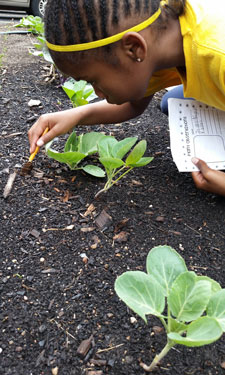 Just outside of the Jackson Park Terrace apartments in Chicago’s Woodlawn neighborhood lies a plush, green garden overflowing with fresh produce. This community garden, which was once a parking lot, is flourishing with the help of Experimental Station, a nonprofit working to build cultural infrastructure on the South Side of Chicago, and the residents of the neighborhood.
Just outside of the Jackson Park Terrace apartments in Chicago’s Woodlawn neighborhood lies a plush, green garden overflowing with fresh produce. This community garden, which was once a parking lot, is flourishing with the help of Experimental Station, a nonprofit working to build cultural infrastructure on the South Side of Chicago, and the residents of the neighborhood.
“As it stands currently in our second year, the Experimental Station has taken over the coordination and planning portion of two-thirds of the garden, while the residents share beds on the remaining third,” says Kim Werst, market manager for 61st Street Farmers Market and coordinator of the garden’s program. “For now, I plan the crop rotation and planting for the year in the winter so we know what seeds to start and when, and what items will be direct seeded or transplanted.”
According to Werst, residents of the low-income neighborhood have taken a keen interest in helping with the urban garden and learning about the crops — almost all of which are consumed by the community. “Darrell Watson, aka Chico, is a resident who not only waters daily but helps with a lot of the garden tasks that myself, volunteers and the youth programs can’t get to each week,” says Werst. “He also coordinates community planting and harvesting throughout the year and helps to ensure the garden is approachable for residents and community members.” Furthermore, a growing number of residents are getting involved in the How-To and Chef Demo Days, where residents are able to sample foods grown at the garden and learn how to plant their own beds.
The community’s youth are also very involved in maintaining the garden and learning about healthy habits through gardening programs at Andrew Carnegie Elementary School. These food education programs give kids a chance to get their hands dirty in the garden and even learn how to cook the food they are growing. “The best part is seeing the youth so excited to ask questions and tell me about every little thing they see, do and learn as they go,” says Werst. “With repeated exposure to foods offered at our market, an understanding of how they grow and experiential learning, we hope the youth will find a newfound love for fresh, locally grown food and will have a deeper connection to our farmers, while learning valuable skills they will use for a lifetime.”
Catrina Belt is an Editorial Intern for Parks & Recreation magazine.

